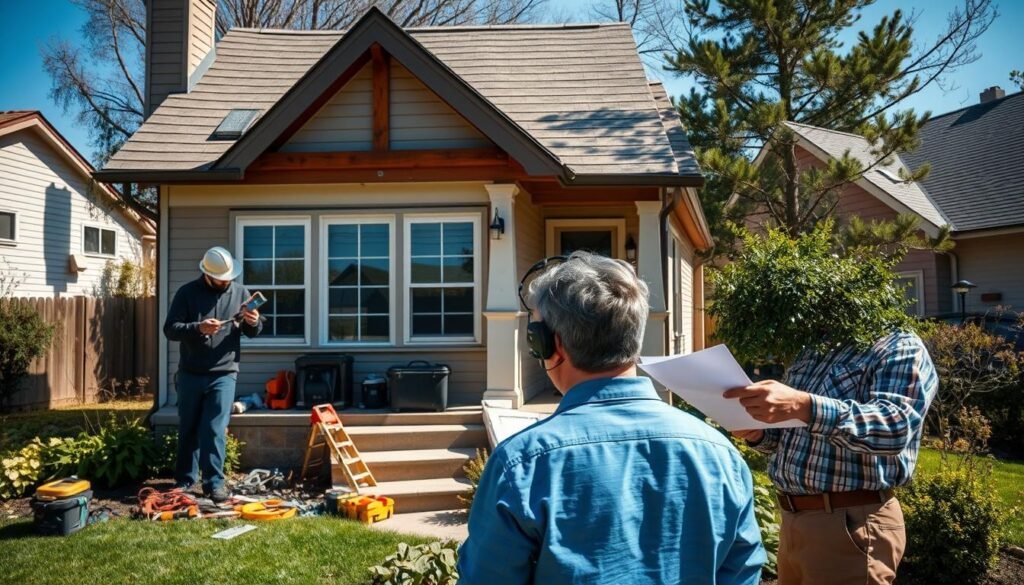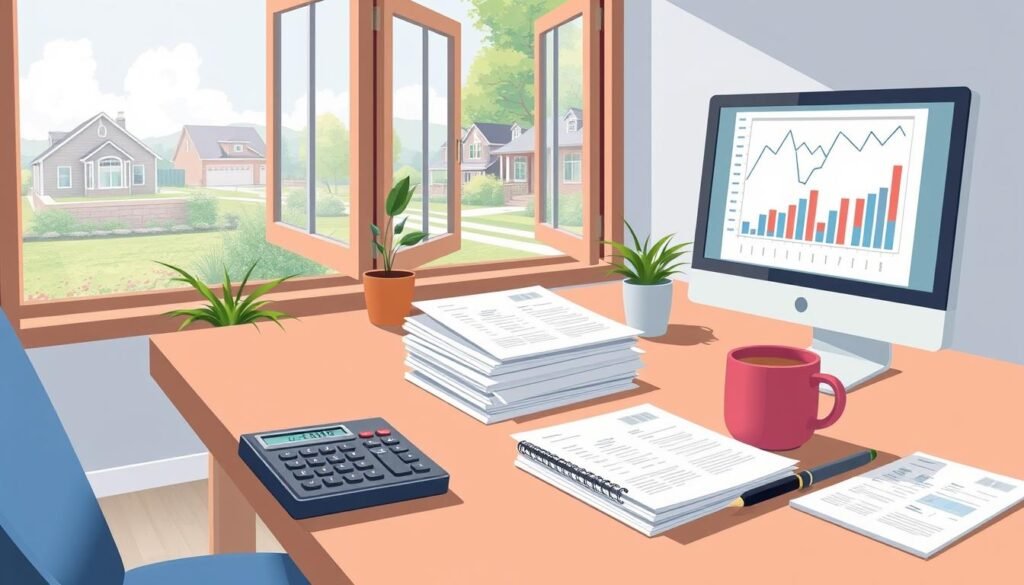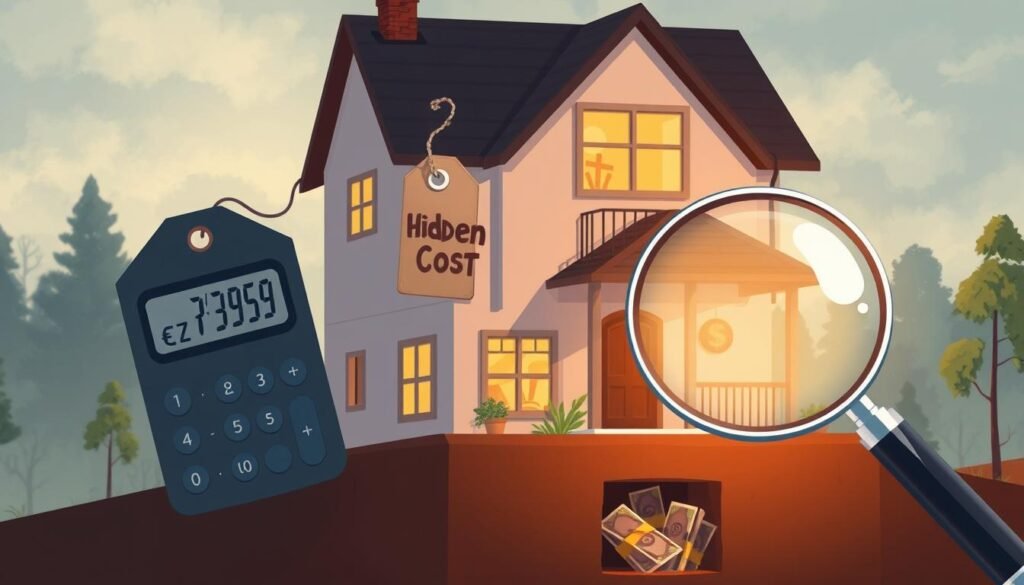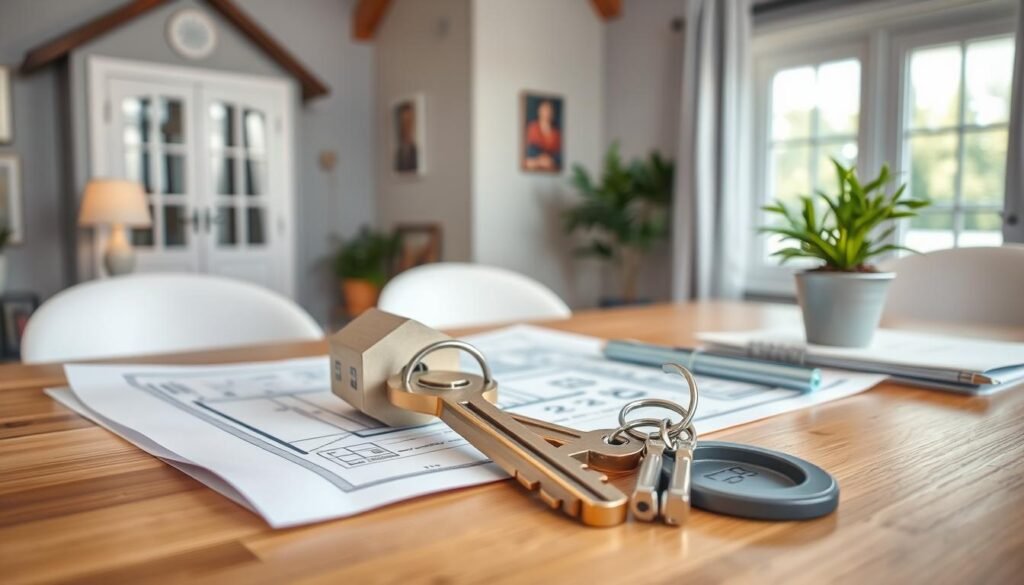This post may contain affiliate links, which means I may earn a commission if you purchase through these links at no extra cost to you.
Starting your homeownership journey is thrilling. Yet, hidden behind the attractive listings and dream home hopes, there are hidden costs. These unexpected fees can range from earnest money deposits to moving costs. They can stretch your budget if you’re not ready. Prepare for these unforeseen costs in home buying. Knowing about unexpected expenses when buying a house helps you avoid financial shocks.
Table of Contents
ToggleKey Takeaways
- Factor in 2-5% of your mortgage amount for closing costs to avoid budget strains.
- Home inspections average at around $339, essential for enlightening your purchase decision.
- Reserve at least 1% of the purchase price for earnest money deposits to secure your intent.
- Anticipate moving costs, which average $1,624 locally and $6,060 for cross-country moves.
- Plan ahead for property taxes that can be included monthly in your mortgage payments.
- Prepare for homeowners association (HOA) fees that tend to cover shared community services.
- Strategically allocate funds for an emergency, aiming for three to six months of expenses.
Understanding the Mortgage Landscape for New Buyers
Starting your home-owning journey is thrilling but also challenging, particularly with mortgages. For newcomers, it’s crucial to grasp the basics of mortgages. This mortgage guide for first-time homebuyers aims to ease this process. It offers vital knowledge and tips to confidently secure a mortgage.
Looking into the various mortgage types is a key first step. USDA and VA loans allow zero down payment, which is great if you’re eligible. FHA loans require just 3.5% down, making homeownership more accessible. Conventional loans might need as low as 3% down. Yet, a higher upfront payment can cut future mortgage insurance costs.
Beginner’s guide to home financing highlights the need to match your mortgage with your finances and housing needs. Comparing mortgages is essential. It’s crucial for planning for home-related expenses. Below is a comparison table of down payment needs and costs for different mortgages:
| Mortgage Type | Down Payment | Typical PMI Costs |
|---|---|---|
| USDA Loan | 0% | N/A |
| VA Loan | 0% | N/A |
| FHA Loan | 3.5% | 0.85% |
| Conventional Mortgage | 3%+ | 0.3% – 1.5% |
This info helps you think about what you can afford and estimate monthly payments. Expert advice often suggests keeping your total mortgage payment under 28% of your monthly income.
Begin by checking your finances, preparing your documents, and looking into lenders. A larger down payment can ease monthly payment strain, reduce PMI needs, and get you better loan terms.
Evaluating Home Inspection and Appraisal Fees
When looking into the hidden costs of buying a home, it’s key to know about home inspection and appraisal fees. These extra expenses for home buying are crucial for checking the property’s value and condition. They often catch first-time buyers by surprise.
A thorough home inspection checks the home’s structure, major systems like heating and cooling, and appliances. It can reveal problems and help in negotiating the price. This might save you big money later on. An appraisal checks if the home’s price matches its market value. This is vital for getting a mortgage for the first time.

Knowing the costs of these services matters a lot. Home inspections usually cost between $300 and $500. Appraisal fees are about $300 to $400. These aren’t just extra costs but investments in your future home.
Keep in mind, these are upfront costs. You’ll need to pay them before closing.
| Service | Typical Cost Range |
|---|---|
| Home Inspection | $300 – $500 |
| Appraisal | $300 – $400 |
| Additional Tests (e.g., Radon) | $100 – $200 |
| Loan Origination Fee | 0.5% – 1% of loan amount |
| Closing Costs | 3% – 5% of loan amount |
Looking into safety and the real value of a home early is smart. It prepares you and makes sure your investment is solid. Remember, knowing these details can make buying a home much smoother.
Escrow and Prepaid Expenses: The Overlooked Budget Items
Escrow account management is critical when buying a home. It handles the balance of your funds for property taxes and homeowner’s insurance. You may need to initially fund your escrow account. This can be an unexpected cost. Understanding how to manage these accounts can help avoid future financial shocks.

Long-Term Maintenance: Anticipating Future Home Expenses
Planning for future expenses helps maintain your home’s value. It’s wise to save 1% to 3% of your home’s value each year for maintenance and repair costs. Making a home improvement and maintenance checklist helps organize tasks and avoid unplanned expenses. It ensures you don’t overlook important property upkeep.
Property Taxes and Insurance Premiums: Planning for Annual Obligations
Homeownership brings yearly financial duties like property taxes and insurance. Homeowner’s insurance costs can change based on your location and home’s size. These cover potential damage from unexpected events. Property taxes, too, are ongoing and can vary. Learning about these costs through resources like financial guides on homeownership can ease the stress of these yearly payments.
Knowing these hidden costs helps you financially prepare and keeps the happiness of owning your dream home. Planning for these costs secures your property and your peace of mind.
Navigating Closing Costs and Reserves
As you get close to buying your home, knowing about different costs is key. Closing costs usually make up 2% to 10% of the sale price. They include many fees. Some you can negotiate or share with the seller. This step is vital for first-time buyers to get a mortgage ready. That’s why it’s so important to keep in close contact with your mortgage lender.
Breaking Down Lender Fees and Third-Party Charges
Lender fees and third-party charges will come up. Loan origination fees are one example. They are about 0.5% to 1% of your mortgage. Appraisal fees are another. They generally cost between $300 and $500. Then, there are third-party fees.
Third-party fees cover things like title insurance and survey costs. Title insurance can be up to 1% of the mortgage. Survey costs may vary from $400 to $1,000. Other fees include home inspection costs. These are important for finding any issues in the home. They usually cost between $300 and $550.
The Role of Reserves in Securing Your Home Purchase
Lenders might ask for proof of financial reserves. This is your cash on hand beyond down payment and closing costs. It shows you can manage the mortgage payments and other costs, protecting the lender’s investment. Reserves are a safety net. They are among the top mortgage tips for new homeowners, ensuring the home purchase is sustainable.
Getting ready for these costs with good mortgage advice for beginners eases the mortgage process stress for first-time buyers. Don’t forget to plan for homeowner’s association dues and maintenance costs in your budget.
Final Thoughts
To make your home dreams real, you must plan and budget carefully. This includes big costs you’ll face. The average house price in the U.S. is about $428,000 as of July 2022. So, knowing your finances is key. This means understanding everything from earnest money, usually 1% to 3% of the home’s sale price, to other fees like appraisals and home inspections that can top $300.
It’s also key to know that the average closing costs in the U.S., which include taxes, are about $6,837. Plus, ongoing costs like state-specific property taxes and homeowner’s insurance, usually $1,784, are critical to plan for. Since 18% of buyers lowball their total expenses, it’s crucial to account for all charges. This includes loan fees, escrow costs, and possibly mortgage insurance premiums. After moving in, be ready for additional costs like moving and immediate home improvements.
Owning a home is more than just buying it. It involves planning ahead and managing your money wisely. Financial experts suggest setting aside 1% of your home’s value each year for upkeep and repairs. By being diligent and consulting with real estate pros, you can ensure your money management will benefit you long after moving in. Making your home dreams come true requires attention to detail and financial wisdom.



